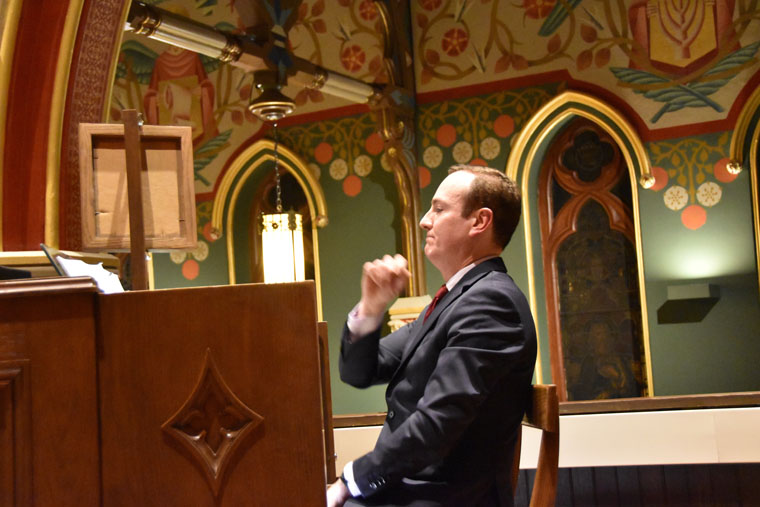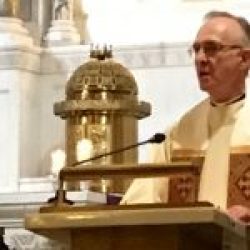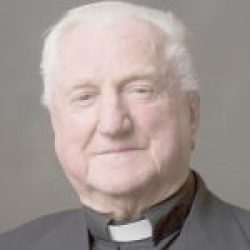St. Patrick’s Cathedral organist — ‘best of the best’ — gives concert
By Tom Maguire | Associate editor

Organist Daniel Brondel says: “Great music involves fast but also involves slow and loud and soft and everything in between.”
The visiting organist’s aim was majestic — like the cathedral he came from.
“It’s such an honor to be invited to play, and I try to make this a better world through music,” said Daniel Brondel, associate director of music and organist at St. Patrick’s Cathedral in Manhattan. “I try to improve lives through music.”
Brondel, who started in music shortly after 10 years of age in France, concertizes in Europe and the United States. On March 29, hundreds of people, including Bishop Robert J. Cunningham, attended Brondel’s Lenten Evening Concert at the Cathedral of the Immaculate Conception in Syracuse.
Brondel’s visit was arranged by Father Joseph J. Clemente, administrator of St. Cecilia Church in Solvay and Our Lady of Peace in Syracuse.
“He’s the best of the best,” said Father Clemente, an organist himself. “He is. He’s probably the finest organist St. Patrick’s Cathedral has known, maybe in its history; I venture to say he’s that good. … I mean he just screams the glory of God.”
How did Father Clemente get the renowned organist to play here?
“Through correspondence with him, and a little begging. … He holds dear the mission of bringing beauty to people through the pipe organ. Beauty puts us in touch with God.”
SUBLIME COMPOSERS
Brondel played six pieces in each half of his program on the Syracuse cathedral’s Roosevelt-Schantz Organ, which Father Clemente said was built in 1892 and restored and added to in 1980. It has 68 ranks or sets of pipes and 54 different voices on three 61-note keyboards and a 32-note pedalboard.
Father Clemente had said the pieces Brondel selected “will show the various colors of this instrument. There are some very serious French organ school pieces; there’s Bach, of course; … and he’s got a Mozart piece … and of course Mozart’s music is fiery and humorous.”
Brondel, slender and tall, wore a dark suit, white shirt, and red tie. His shiny black shoes alternately slid on and tapped the pedalboard as he played. Asked to describe his own speaking voice, he laughed and said, “I don’t. It’s a very good question. I don’t know. In fact, someone in New York a few years back said to me, ‘You almost speak like you don’t have an accent.’”
His first piece, Brondel told the audience, would expose the “beauty of the instrument right off the bat” — Louis Vierne’s “Carillon de Westminster.”
Brondel was alone at the console but the piece sounded as if several organists were playing at once; even the background sounds were thrilling.
Next was Johann Sebastian Bach’s “Choral-Prelude on ‘Erbarm dich mein, o Herre Gott.’” Introducing it, Brondel noted that we are in Lent. “It’s the prayer to God asking him for mercy and to cleanse us from our sins,” he said.
After playing Christoph Willibald von Gluck’s “Melodie d’Orphee (arr. Giovanni Sgambati),” a quietly beautiful tune, Brondel praised composer No. 4 on the program: Wolfgang Amadeus Mozart. “He was extremely prolific,” he said — symphonies, operas, piano music, chamber music.
In the last year that he lived, Brondel said, Mozart was commissioned to compose three pieces for the mechanical organ, which Brondel described as sort of like “press a button and it plays.”
Brondel played the second of the three pieces, “Andante in F for Small Mechanical Organ, K. 616.” Mozart wrote it, Brondel said, right after he finished his very famous opera “The Magic Flute.”
“We’ll hear, in fact, two separate flutes playing together,” Brondel said, “and if you close your eyes you might perhaps even imagine a humorous dialogue between two flute players.” The audience loved it.
The attendees had gathered to hear the noted organist, but now he turned the attention on them “so that we could all make music tonight.” He asked them to sing the hymn “When I Survey the Wondrous Cross (HAMBURG).”
THE AUDIENCE’S TURN
“I’m counting on you to sing out tonight and do your part so that I can do mine,” he told them.
Father Clemente had brought 125 people from his parishes. “They know this hymn well,” he had said. “I make sure that people are formed in the skills of worship. That’s important to be done.”
Brondel’s introduction to the sixth tune complimented the organ itself.
“I’m going to close the first half tonight with a piece by Max Reger,” he said. “He composed right at the turn of the 20th century, and he was exploiting the varied orchestral capabilities of German symphonic organs that basically were mostly known for their amazing crescendo. Well, guess what: The organ here has the very same potential. And this Roosevelt organ, like I said earlier, can whisper like a quiet breeze and thunder like an orchestra. So enjoy this ‘Introduction & Passacaglia.’”
Interviewed during the intermission, Brondel said: “It’s going well, I think. … I was blown away by how well people sang, how much gusto people sang with. … I guess they’re pretty excited tonight, so it’s a good sign; it kind of shows that I didn’t put them to sleep, you know?”
Does the organist try to pump himself up emotionally?
“No,” he said, “I try to keep my wits about myself. … I focus on not getting caught up in the music actually.”
“It becomes like giving a speech from memory almost,” added Alan Lynch, director of the music ministry at the Cathedral of the Immaculate Conception. “You can’t be thinking about the emotional impact, you have to be keeping your wits about you.”
Asked if his expectations differ when he goes outside his grand home base in New York, Brondel said:
“Oh, no. No, not at all. No, because I think it’s such an honor to be invited to play somewhere. I think it’s my duty, of course, to keep the same high expectations of myself, of course, so that I can improve the lives of people who came to hear me, hopefully.”
“I always hope,” he added, “that people will leave my concerts feeling better.”
IT’S A REAL JOB, ALL RIGHT
As a youth in southern France he didn’t think that music would become his profession: “My family wanted me to get my education, get a real job, all that kind of stuff. …
“It’s terribly hard to make a living as a musician, and it’s not solely a question of talent; it’s also a question of luck, to a certain extent, and being at the right place at the right time; recognizing opportunities when they come your way; it’s also a lot of hard work. I think you have to work at your craft a lot longer than most other professions require. …
“I totally understand why families prefer for their children to go toward what is commonly known as a real job. I think it makes perfect sense. … I’m one of the lucky few who have been able to make a living as a musician.
“So no, I never lower my expectations when I go play out of town anywhere because I think it’s a privilege to be able to do what I do and to be asked to share what I do with other people.”
Actually, he said it is very much a real job — he usually averages 38 to 50 hours a week. That includes daily work playing the organ for thousands of people at St. Patrick’s, but also practicing his craft, keeping up his chops, and learning new music.
Brondel called his opening set the “more, so to speak, serious half of the program, the one where I played more serious music by serious composers, even though the Mozart piece was a little light.
“The second half basically is going to be a little more about concert, a little less about depth and profundity. It’s going to basically show off more of the different colors of the organ. I’m also playing a transcription that I have made of a piece by [Sergei] Rachmaninoff, one of his first compositions for the piano, the ‘Prelude in C-sharp Minor.’ It’s a very famous piece. It works very well on orchestral type of instruments, like this one — romantic organs — again, because it exploits the very gradual, beautiful crescendo and diminuendo.”
Before commencing the second half, Brondel told the audience: “Hopefully one day you will have a chance to visit St. Patrick’s and hear the organ either played by myself or by one of my great colleagues, and I think you will never forget it if you do.”
First was Pietro A. Yon’s “Humoresque: L’organo primitivo.” Brondel called it a toccata, defined in the dictionary as a composition in free style with full chords and elaborate runs.
But humorous music in a church?
“Well, yes,” Father Clemente had said, “because the church has always been a patron of the concert, and that’s our tradition, especially cathedral churches. … And so, therefore, this tonight is about hearing this high art form in a cathedral church — a great organ by a great organist.”
After Rachmaninoff’s “Prelude” came a piece that Brondel said highlighted “the more fluty side of the organ” — Charles-Marie Widor’s “Andante sostenuto.” The piece included beautiful high notes and a dominant passage using only the pedals.
Composer 10 was Jehan Alain: “Deux Danses a Agni Yavishta, JA 77 & 78.” Brondel said Alain was a French composer “who died tragically young [1911-1940] serving his country during World War II. And in his short life he composed what was considered modern music at the time.” “Deux Danses,” Brondel said, is Alain’s “homage to Hinduism” — the first dance uses the oboe of the organ, and then the second dance is much slower.
A PERFECT MATCH
Brondel announced that the penultimate piece is very famous: Samuel Barber’s “Adagio for Strings, Op. 11 (arr. William Strickland).”
“When I saw the description of the organ a few weeks ago when I was talking with Father Clemente,” Brondel said, “I realized that piece would probably sound amazing on this organ. It’s a fairly sad piece. You’ll recognize it when you hear it. … You can put into it what you want. It could be nostalgic, it could sad, it could be painful. I think it’s a piece that I like to put in because it makes us … explore our own emotions.”
Before the finale, Brondel announced:
“This organ, I think, is a triumph of … engineering and longevity, and it’s so wonderful that it’s been preserved in this great commission here. … I want to express my gratitude to you all for being here this evening. I thank Alan Lynch and Ryan Boyle for maintaining this organ so beautifully, and I want to thank also Father Clemente for inviting me; and the cathedral staff for making everything go smoothly. So I am just so happy to have come to Syracuse.”
He closed with the final movement of the first symphony by Vierne, the same composer whom he had opened the concert with. The piece, Brondel said, “evokes a lot of joy, triumph, and all that kind of emotion.”
The audience answered Brondel’s virtuosity with a standing ovation.
“I think he’s phenomenal,” Lynch said.
He added: “I think he has a very wide range of repertoire, pieces from a lot of different countries, pieces by contemporary American composers. I thought his program was incredibly engaging and he’s one of the best organists in the country, no doubt, so we’re lucky to have him here.”
Lynch and Boyle, vice president of Kerner & Merchant Pipe Organ Builders, of East Syracuse, had both spent several hours working on repairs and tuning the Roosevelt-Schantz Organ. Father Clemente said Lynch did the extensive restoration work on the leaking air chests on which the pipes sit, and Boyle tuned until 3 a.m. to make sure the organ was perfect for the concert.
A MELODIOUS OBSESSION
“Few pipe organs are in absolutely perfect condition,” Boyle said in an email. “Most organs have what we affectionately refer to as a ‘personality,’ a handful of minor issues ranging from the occasional pipe not matching its neighbors perfectly in tone, color, or volume, to mechanical issues where an occasional note might not play reliably when the organist presses the key.
“Any well trained organist can compensate for these nuances in their playing. However, the most virtuosic performance will always be ruined by an organ which is out of tune. It was an honor and a pleasure to have had the opportunity to prepare the cathedral’s fine Roosevelt pipe organ for Monsieur Brondel’s performance.”
Father Clemente, whose “obsession” is pipe organs, was ebullient after the concert. He had said: “I like to explore organs all over the world. I have visited and played many instruments in Europe and America. Because of my ministry as a priest, I do not practice like I should to remain competent as a player.”
Brondel’s performance, he said, “could not have been better, and the variety and the color were spectacular!”
Just as he expected?
“Just as I expected.”
















